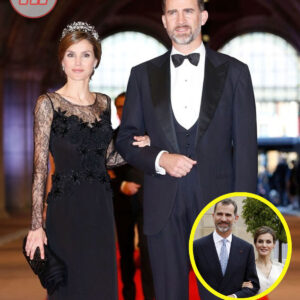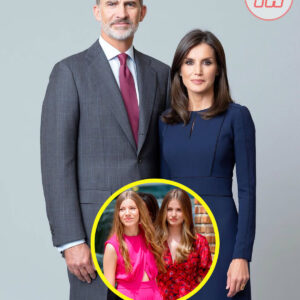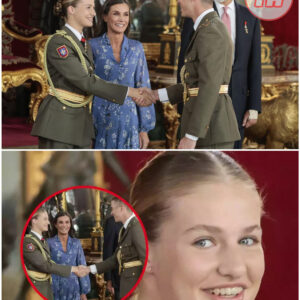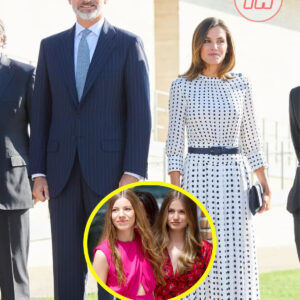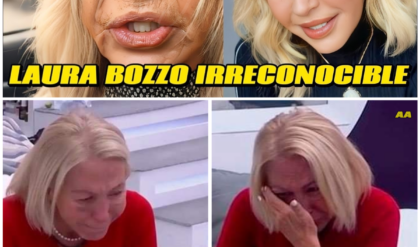Urgent Letter from Juan Carlos I to Leonor Following Felipe VI’s Decision to Cancel His Entry
In a development that has captured public attention and stirred speculation within the Spanish royal family, recent reports suggest a significant event involving King Felipe VI’s decision to cancel the entry of his father, Juan Carlos I, into Spain. This decision has purportedly prompted Juan Carlos I to write an urgent letter addressed to his granddaughter, Princess Leonor. The contents of this letter, shrouded in intrigue and significance, highlight the complexities of family dynamics, royal protocols, and the repercussions on Spain’s monarchy.
Juan Carlos I, born on January 5, 1938, played a pivotal role in Spain’s transition from dictatorship to democracy. As King of Spain from 1975 to 2014, he oversaw significant political reforms, earning widespread acclaim for his efforts in promoting democracy and national unity. However, controversies surrounding his private life and financial dealings have cast a shadow over his legacy in recent years.
Following his abdication in favor of his son, King Felipe VI, in 2014, Juan Carlos I has maintained a lower profile, residing primarily outside of Spain amid ongoing investigations and legal challenges. His relationship with the Spanish monarchy, particularly with his son and grandchildren, remains a subject of public and media interest.
Recent reports indicate that King Felipe VI made the decision to cancel his father’s planned entry into Spain, citing concerns over the potential impact on the monarchy’s reputation and public perception. This decision, reportedly made in consultation with advisors and government officials, underscores the complexities of balancing familial ties with the responsibilities of royal governance.
The cancellation of Juan Carlos I’s entry has sparked speculation about the underlying reasons and implications for Spain’s monarchy, including the broader implications for public trust, transparency, and ethical conduct within royal circles. The decision reflects a strategic move to manage public relations amidst ongoing controversies surrounding Juan Carlos I’s financial affairs and legal proceedings.
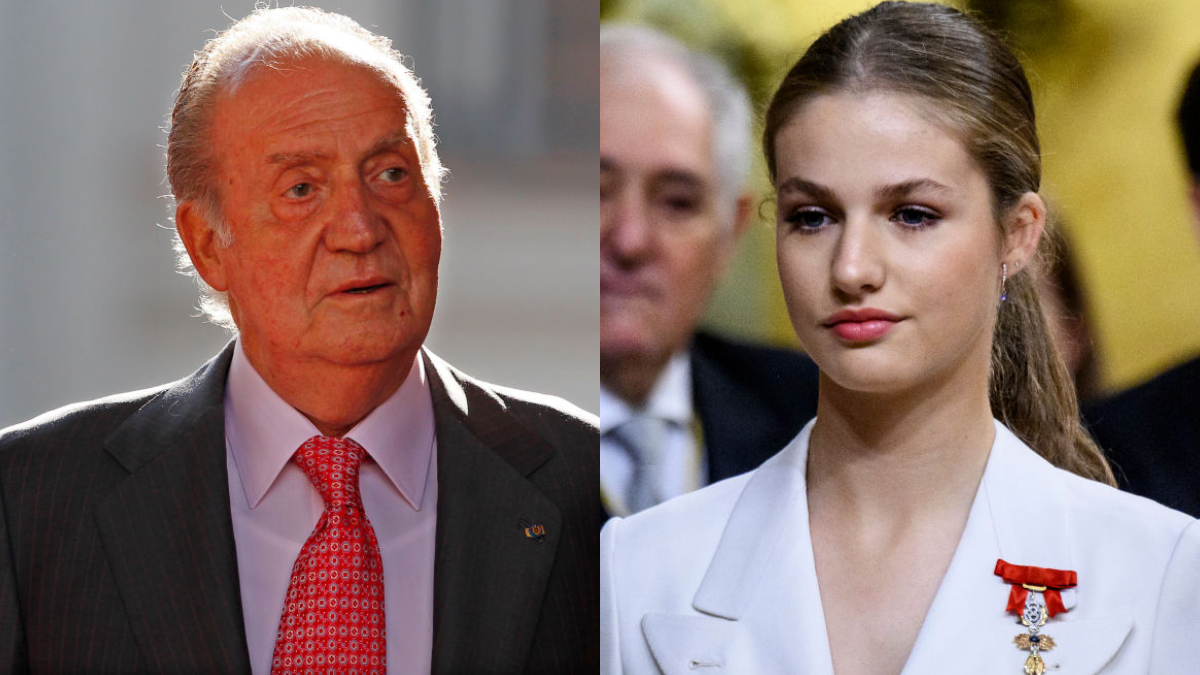
In response to Felipe VI’s decision, reports suggest that Juan Carlos I penned an urgent letter addressed to his granddaughter, Princess Leonor. The contents of this letter, characterized as urgent and heartfelt, are rumored to convey personal reflections, familial sentiments, and perhaps insights into the challenges facing the Spanish monarchy.
The letter’s significance lies in its potential to influence perceptions of Juan Carlos I’s legacy, his relationship with future generations of the royal family, and his perspectives on monarchy’s evolving role in contemporary Spain. As a direct communication to Princess Leonor, who represents the future of Spain’s monarchy, the letter may offer insights into Juan Carlos I’s hopes, regrets, and aspirations for the future of his family and country.
The emergence of Juan Carlos I’s urgent letter to Princess Leonor highlights the interplay between personal relationships, institutional responsibilities, and public expectations within the Spanish monarchy. The letter’s reception among royal circles, government officials, and the public will likely shape discussions about transparency, accountability, and the evolving role of monarchy in modern society.
The decision to cancel Juan Carlos I’s entry into Spain and the subsequent letter to Princess Leonor underscore broader questions about the monarchy’s integrity, ethical standards, and the management of familial and public affairs. As Spain navigates these challenges, the monarchy’s ability to maintain public trust and relevance hinges on its responses to internal controversies and external scrutiny.

In an era characterized by digital media and instantaneous communication, the coverage of Juan Carlos I’s urgent letter to Princess Leonor exemplifies the intersection of traditional royal protocols with contemporary media dynamics. The dissemination of rumors, speculations, and interpretations through online platforms underscores the influence of social media in shaping public discourse and perceptions of royalty.
The role of media outlets, journalists, and commentators in interpreting Juan Carlos I’s letter and its implications reflects broader trends in media consumption and the public’s fascination with royal narratives. The ongoing interest in royal family dynamics highlights the enduring appeal of monarchy as a subject of cultural intrigue and national identity in Spain and beyond.
As discussions surrounding Juan Carlos I’s urgent letter and Felipe VI’s decision unfold, attention turns to reflections on the monarchy’s legacy, resilience, and future trajectory. The letter’s impact on Princess Leonor, her role as a future monarch, and the broader implications for Spain’s monarchy will shape perceptions of continuity, change, and adaptation within royal circles.
In conclusion, Juan Carlos I’s urgent letter to Princess Leonor offers a compelling glimpse into the complexities of familial relationships, royal responsibilities, and the enduring legacy of Spain’s monarchy. Beyond the headlines lie deeper narratives about tradition, modernity, and the evolving expectations of royalty in contemporary Spain. As conversations progress, the monarchy’s ability to navigate internal challenges and external pressures will shape its role as a symbol of national unity and cultural heritage in the years to come.
News
El coste de la monarquía española: Los reyes Letizia ganan una enorme cantidad de dinero cada año
La Zarzuela aplicó una subida del 3% respecto al presupuesto del 2022, tanto a las retribuciones de los Reyes como las del resto de funcionarios. El costo de la monarquía española: el Rey cobró más 250.000 euros y la reina…
La infanta Sofía y Leonor desencadenan un problema de celos que parte a Zarzuela en dos
No todos ven bien en Zarzuela que Leonor y Sofía hayan adquirido un fuerte protagonismo En los últimos meses, la familia real española ha sido escenario de un conflicto que ha sacudido las bases de Zarzuela. La revelación explosiva hecha por Jaime del Burgo ha intensificado la…
En qué se gasta el dinero la Familia Real: 4,1 millones en personal, 550.000 en teléfono y 60.000 en libros y prensa
Uno de los temas que más polémica genera en la política española es la cuestión monárquica. No solo por los escándalos asociados a la institución, sino también por el dinero que reciben anualmente. Como dispone el artículo 65.1 de la Constitución,…
CONOCE AL CADETE QUE CASI BESA A LA PRINCESA LEONOR
Conoce al Cadete que Casi Besa a la Princesa Leonor: Un Incidente que Conmocionó a España Recientemente, España ha sido testigo de un incidente que ha capturado la atención de medios y público por igual: un cadete de la Academia…
La princesa Leonor se une a Sofía para la foto ‘Pero por orden de la reina Letizia’
La Princesa Leonor se Une a Sofía para la Foto: “Pero por Orden de la Reina Letizia” La fotografía de la Princesa Leonor y la Infanta Sofía, capturada recientemente en un evento oficial, ha generado una avalancha de especulaciones y…
El ultra lujoso estilo de vida de la Princesa Leonor de España
El Ultra Lujoso Estilo de Vida de la Princesa Leonor de España: Un Vistazo a la Vida de la Heredera La Princesa Leonor de Asturias, hija mayor del Rey Felipe VI y la Reina Letizia, no solo es la heredera…
End of content
No more pages to load
